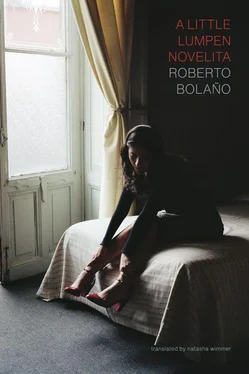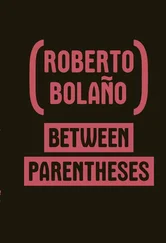The kitchen was big and it was dirty. Not because it got much use, which it didn’t, but because it needed someone to come and give it a deep cleaning, to sweep away the dust that had been gathering in the corners for months, maybe years, but Maciste didn’t want to hear it.
The bathroom we used after fucking was the only place in the house that was really clean. The bathtub was huge and
instead of a shower curtain it had glass doors, like the kind you see in some movies, doors that Maciste had gotten specially installed, in addition to handrails on the walls that he didn’t need, since he moved around the house like someone who could see.
Next to the bathtub there was a little stall with a high-pressure cold-water shower that Maciste called a Norwegian shower. It had a glass door too.
While I showered, Maciste sometimes sat on a wooden stool in the bathroom and ate his sandwiches. We talked about all kinds of things. About my parents’ accident and how the loss had affected me (his parents were dead too). About recent movies that I had seen (he’d seen his last movie fifteen years ago). About things that happened next door.
The truth is, I didn’t have much to say to him.
When I opened the glass door and saw him eating, it gave me a funny feeling — it was like he was someone else, and I was someone else too, and I didn’t like it.
Then I would ask him questions, because the silence he was used to was more than I could stand. So I learned his real name, Giovanni Dellacroce, though real only stands for a different kind of unreality, a less random, more fleshed-out unreality, and I learned the exact dates, from before I was born, when he had been crowned Mr. Italy and then Mr. Europe and finally Mr. Universe, which was the first time an Italian had won the world bodybuilding championship, at a competition held in Las Vegas, and I also learned that he’d been to all the great cities of Europe and America (the exact dates: year, month, day), and that he’d been the friend of politicians and famous artists, of movie actresses and soccer players on the national team or for Rome, and that he’d worked on lots of movies, among them the three or four (he was precise about the number, but I’ve forgotten it) in which he played Maciste, and that sometimes he’d been the good guy and other times, in the end, the bad guy, because that’s how it goes, he said, in the beginning you’re almost always the good guy and in the end you’re always the bad guy.
Other times I tried to go off on my own in the house.
“I’m going to take a walk around your castle,” I would say, and hurry off, before he could object or say no.
The house had two floors and it was the biggest house I’d ever seen from the inside (it still is). It was so big that it seemed rooted in the earth. On the second floor there were at least four or five empty rooms. On the first floor was the living room, which Maciste used occasionally, mostly to take naps, and the dining room, which had become a kind of passageway or labyrinth where furniture from other rooms was piled up, cots and mattresses, electric heaters, chairs and tables, wardrobes full of cobwebs, and where there were stacks of old sports or movie magazines. Everything was organized in some way that Maciste never explained to me, though it wasn’t hard to figure out that the room’s main purpose was to clear obstacles and hazards from other parts of the house.
Then there was the kitchen, which I’ve already described, and a full bathroom with broken mirrors and a huge gouge in the bathtub. There was also a windowed room that led to the big, crowded foyer, full of useless curtains, and a terrace that led to the back garden and the walls of the neighboring houses. To either side the buildings looked normal, but in back, the houses with entrances on Via degli Scipioni were as silent as Maciste’s, no sound of television or radio or children’s voices or adults calling to children or to each other. Once I heard the chirp of a cell phone, but only once.
On the second floor, besides the empty rooms, was Maciste’s room, big, with its shutters always closed. There was a full-length mirror abandoned in a corner, which Maciste must once have used for daily self-evaluations and possibly also to make love with movie actresses, and a huge bed with a reinforced frame custom-built to support the weight of its owner. Otherwise, the room had a monastic air, of spaciousness and poverty.
Then there were two bathrooms, the big one where I showered and a small one where the last cleaning woman had piled the tools of her trade — a couple of buckets, a mop, several bottles of bleach — before leaving for good, sick of the blind man.
Past the windowed room was the gym where Maciste seemed to spend most of his time, pedaling on a stationary bike or lifting weights, his mind elsewhere, or, more frequently, lying indolently on a long wooden bench in his black robe and sunglasses with a white towel around his neck, thinking about his glory years or maybe — hopefully — thinking about nothing, his mind blank.
Next to the gym was the reading room or library (that’s what he called it), in which there wasn’t a single book. There were two oil paintings, though. One of them was of Maciste, half-naked, accepting the world bodybuilding championship belt. The other was of Maciste sitting in that very library, behind an oak table that was still there, wearing a suit and tie and with a faint smile on his face, as if he were laughing at the painter and everyone who would ever look at the painting, as if behind everything that surrounded him there was a secret and only he knew it.
Between the two paintings there was a niche holding an icon of St. Pietrino of the Seychelles.
“St. Pietrino of the Seychelles? The Seychelle islands?”
“Yes,” said Maciste.
“He went so far away — who is this St. Pietrino?”
“A saint.”
“Yes, but what kind of saint? I’ve never heard of him. It must be a joke.”
“No, it isn’t a joke,” said Maciste. “He’s a modern-day Roman saint who was born in Santa Loreto, like me, and one day he went to preach in the Seychelles, that’s all.”
Since I didn’t feel like arguing, I let it go and walked around the house some more. There was no safe anywhere to be seen. I looked for it many times, but I could never find it.
Sometimes, while I was looking for the safe and going from room to room, moving things and putting them back again, I would hear — or rather sense — the presence of Maciste, in his black bathrobe or naked, moving through the darkness of the house following the sound of my footsteps, the almost imperceptible noises I made, until suddenly he would grab me from behind, wrapping me in a bear hug, no matter how careful I tried to be, no matter how stealthy my movements.
And then, when I was in his arms and he was bearing me off through the darkness, or when I was under him or next to him, in the bed or in the gym, every inch of my body slathered with lotion, I would give thanks that I hadn’t found the safe, at least not yet.
And sometimes I imagined sleeping there every night, with Maciste, and I imagined hiring a woman to do the cleaning (because in my dreams I didn’t intend to be his slave), and convincing him to go out every once in a while, maybe not to the movies but for a walk, like two normal people or two people who pretend to be normal and by pretending actually are normal or become normal, and I saw myself calling a taxi once a week, on Fridays maybe, to come and pick us up and take us to a nice restaurant where we would have a leisurely dinner, with conversation about all kinds of things, or to take us downtown, where I would buy clothes for him at one of those stores for big men, and then clothes for me, and I even imagined myself going to the movies with Maciste, and describing what was on the screen, the way companions of the blind are supposed to.
Читать дальше












